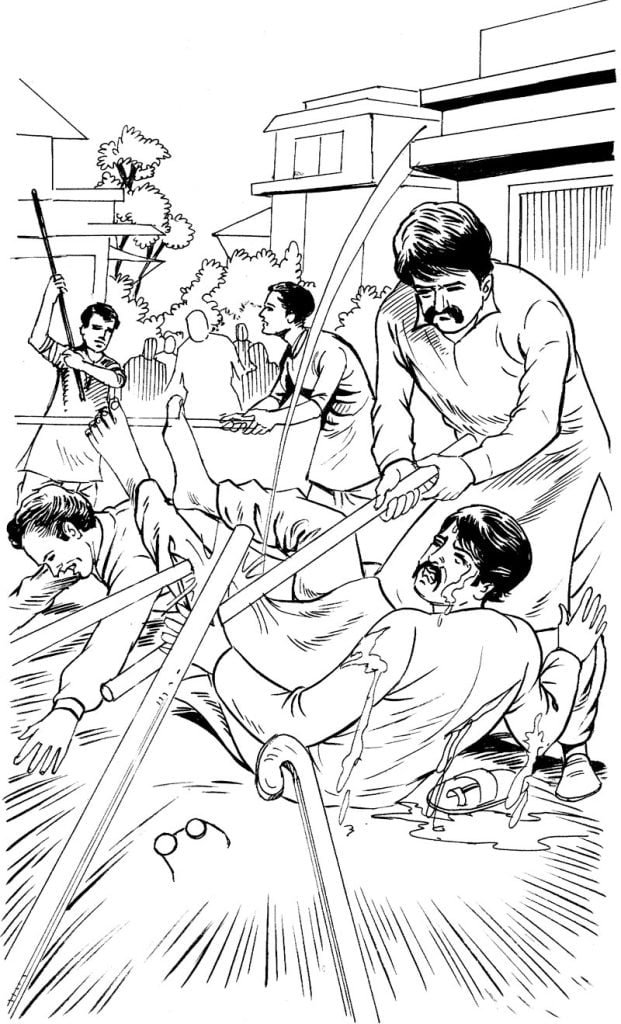Their crime was only that they wanted to free their country from the cruel clutches of colonial rulers. They would not breathe the air loaded with the foul smell of slavery. From a far off land aliens had descended on India and usurped the power through superior force and trickery. They were now deciding who had the right to live in India or not. Those aliens themselves had no right to be in India.
But the barbarism was having an upper hand for the time being. The justice was hibernating in the cold cave of colonialism.
The condolence meetings were being held all over India to pay tribute to the martyrs.
The city of Kanpur observed a complete strike to protest the barbaric hangings. In the evening a condolence meeting was held in Phoolbagh. It was attended by thousands of grieving citizens of the city. It appeared that the entire population of Kanpur had converged there to cry for revenge against the colonial rulers.
Of course, the grim faced Vidyarthi was there to share the grief. It was natural that he would be asked to speak. The close associates knew how close Vidyarthi was to the hanged youngmen.
Ganesh Shankar Vidyarthi spoke but graciously did not mention his personal relationship with the departed souls. It was not the time to advertise his own connections to them to earn people’s respect. Vidyarthi was too good a gentleman to do that and he was a true patriot devoid of any selfish motive.
He paid his tribute saying, “The soul can not be destroyed by disposing off a body. Sardar Bhagat Singh is not dead but has become a martyr. Sukhdev and Rajguru also suffered physical elimination in hanging but their souls were happy and free. Their souls could not be imprisoned or destroyed. In every Indian heart live their souls. Their sacrifice will not go in vain. Those great souls of India will live for ever and ever.”
While paying the tributes his voice was choking. The people had moist eyes. Some emotional ones were seen sobbing or crying. But every eye flashed an anger that would burn the British then or in near future.
Next day, Pratap brought out a special issue which printed a letter written to Sardar Kultar Singh, the younger brother of Martyr Bhagat Singh by the deceased before he was hanged.
It was printed on the front page.
It was the last thing or words written by the martyr. An unprecedented number of the copies of that edition of Pratap was sold. Demand was such that it was very much likely that the newspaper would have reprinted the letter in its later editions to satisfy the readers.
Everyone appeared to be wishing a copy of that letter for memory sake.
It unnerved the authorities. A rebellious atmosphere against the British government was building up. There was danger of its reaching the flash point which could blow away the administration.
The British desperately needed something to distract attention of the people from the Bhagat Singh hanging.
There could be no better way of doing it than sparking off a communal riot between Hindus and Muslims. With communal passions aroused the Indian had the tendency to forget about everything else.
The authorities contacted their communal agents and signalled that a communal carnage was required.
Suddenly rumours started flying around. The fanatic elements were running loose. The communal passions began to rise in no time.
The air got filled up with hatred.
Murders, rapes and robberies started being committed with impunity. The daggers were out.
The human beings now looked like mad creatures with blood shot eyes.
The horror shocked the city.
The carnage continued.
Ganesh Shankar Vidyarthi was not feeling well. But he could not remain in the safety of his bed while out there his city was becoming a scene of communal madness, a real spectre.
Vidyarthi set out to put some sense in the people. Clashes were taking place in Moolganj and Generalganj. He rushed to those colonies and doused the frayed tempers.
He than reached the Chatai Colony and worked for peace.
Next day, the trouble again broke out in Ramnarain Bazaar. Chaube Tola and Bajaja Chowk were also burning. Vidyarthi ran to those places and cooled down the heated minds.
He saved hapless Muslims who had got trapped in a mob of Hindu rioters. Similarly he saved Hindus from the Muslim fanatics.
He was going through Nai Sarak after visiting Chaube Tola when some rioters surrounded him and his two volunteers and began to attack with sharp edge weapons. Vidyarthi appealed to them in the name of the sanity to behave like humans.

But the fanatics were deaf and they were baying for blood.
More blows fell cutting and chopping human flash. Vidyarthi and his peace volunteers fell down in a heap of wounded flesh and blood. The fanatics kept axing and chopping the heaps even after that.
Those who attacked Ganesh Shankar Vidyarthi were no humans. They were communal demons who murdered the human decency.
Sometimes it is difficult to believe that humans are any better than beasts or are they worse?
On that day sanity, human decency, idealism patriotism and honesty also died along with the charming face of idealism represented by Ganesh Shankar Vidyarthi.

